- Home
- Adam Thorpe
Pieces of Light Page 3
Pieces of Light Read online
Page 3
While I was convalescing, Mosea read me Bible stories, over and over. I quite enjoyed them. Some of them I knew already from our lessons, or from the Sunday services, but quite a few were new to me. I closed my eyes and easily pictured the scenes: Joseph with his brothers, the parting of the Red Sea, Isaac and Esau’s night voices, the cool night roofs of Jerusalem.
Whenever she came to Moses in the bulrushes, she read it very proudly.
These stories walked between the ju-ju talk and hid some of it. One day, still feeling a bit weak and so staying in bed, I asked my mother again about Hargreaves.
‘Did he shoot himself?’ I asked.
She shook her head and laid her hand on mine.
‘Hugh, darling, where did you learn that sort of thing?’
I shrugged. I just knew it. I was nearly six. For once, her eyes sought mine. They were very dark, my mother’s eyes, exactly the colour of her hair. She’d told me about her great-grandfather, who was Jewish and a travelling merchant from Persia and had married a blonde haberdasher and settled in London. It was this ancestor, she said, who had passed on the dark eyes and hair and skin.
‘Mr Hargreaves,’ she said. She looked away, out of the window. ‘Oh, he thought he was invulnerable.’
‘What’s invulnerable?’
‘The African warriors in the early days wore special shirts or waved fetishes about or bathed in water some witchdoctor had put a spell on, and they thought no bullets could touch them. They thought they were invulnerable.’
‘But they might have been.’
‘They weren’t, Hugh. Not against those horrible machine-guns.’
She stared at a place on the coverlet next to my hands.
‘Mr Hargreaves thought the same,’ she said, very quietly.
‘Against a machine-gun?’
She shook her head, then waited again. What for, I didn’t know, but her eyes kept flitting on to my face, as if I had to give her a signal. She sighed, then she left the room. I had learnt more, but not much.
Another clue, a week later. The harmattan was starting to haze the sun with its fine red dust, but the outside was still sweet after weeks in my room. I liked to visit the chop-shed when Joseph was in there, choosing tins for meals. He was down at the end, in amongst the desserts and sugars. Ants were everywhere, as usual. The lamp was perched next to a row of big square tins covered in dust and cobwebs. There were about twenty of them, stacked three high. Their labels, stained with age, showed a lion lying down, with flies around its head. It looked dead. Tate & Lyle’s Golden Syrup. I tested a rusty dribble on the side with my finger. It was delicious, a bit like honey.
I asked Joseph about it. He chuckled and drew a hand across his sweaty face.
‘Na nyama-nyama ting,’ he said.
Nyama-nyama didn’t mean yummy, it meant ‘bad’.
‘Na poison?’
‘No,’ he laughed. ‘I go tell you, small-small chap, an I go lose my work you say Jack Robinson.’
‘Is it to do with Mr Hargreaves?’
His face quivered, as if I had hit it, and he looked fearfully towards the door. Then he turned his back on me without another word and fiddled about again on the shelves opposite. Yes, the Lyle’s Golden Syrup had something to do with Mr Hargreaves. That’s why no one had touched it. Without really thinking, I seized one of the tins and ran with it out of the chop-shed. Joseph shouted after me.
My mother was down by the river. A canoe was drawn up, and a few boxes of medical things were being unloaded on to the jetty. The tin felt enormous and rather heavy in my arms. She saw me and gave me her usual tired smile, then appeared to jump back as if something had hit her.
‘Where did you get that?’ she said, in a trembling voice.
‘From the chop-shed. Can we have some for lunch?’
‘No!’
She pulled the tin from my arms and threw it into the brown river. The man on the canoe had to duck. She looked at her hands in disgust. They were probably as sticky as mine. The stickiness was dark. It must be very strong ju-ju medicine, I thought. The moment reminded me of the time my parents had shouted at each other one evening, and my mother had thrown a bottle of my father’s gin into the river. Gin, explained Quiri, was strong medicine but made you too happy. Perhaps Lyle’s Golden Syrup made you too happy.
‘Is it like gin?’ I asked.
My mother, still trembling by the river’s frothed edge, turned and let out a wild laugh. It must be like gin, I thought: she’s too happy. The man had finished unloading the canoe and was waiting for his dash. My mother bathed her hands in the river and gave him some cigarettes and a few pennies. He paddled off and she sat on one of the crates. It was marked with a red cross and had ‘Stag Brand Surgical Dressings X 150’ stamped on the side. She looked around her slowly, at the forest, at the river, as if they were about to gobble her up. Her face was very sweaty from moving around too much.
We weren’t supposed to bathe our hands in the river. But now she was pressing them against her face. The water was calm enough, near the edge, to have Billy Harzia’s snails in it.
She asked me to sit down next to her, on the crate. She put her arm round my shoulders and pressed me against her side. This was quite unusual. She never touched me a lot.
We didn’t say anything. She smelt as spicy as everyone else this morning. I wanted to bury my face in her armpit, where the big dark patch had crept up to her shoulder. Instead I said, ‘Did Mr Hargreaves kill himself with Lyle’s Golden Syrup?’
‘Yes,’ she said.
It was poisonous. I would die, obviously. I wondered whether to tell her that I had tasted some, but I didn’t want an emetic.
Then she sighed and said, ‘I’m going to tell you. After a long time away, he came back. At least, Mawangu, I think it was, saw him standing by your window. You were in your cot, still, just two or three months old. He wasn’t in a very good way. Mawangu said hello, but Hargreaves – Mr Hargreaves ran into the cemetery. I was told he was there, but frankly, Hugh, I was frightened. Your – your father was away on tour. I was on my own. I told the servants to come inside. We watched the poor fellow from your window. I held you in my arms, very tight.’
She stood and twisted her hands together and then sat down again.
‘He looked like a wild man, a wild man of the woods. Like Ben Gunn the maroon. He was behind the cemetery, picking leaves and rubbing them on his face and bare arms and legs. Then he gave a shout and broke into the chop-shed. Anyway, it wasn’t locked. I knew exactly what he wanted, and didn’t do anything about it.’
‘Did he want a tin of Lyle’s Golden Syrup?’
‘Yes. Nothing else would do, you see.’
‘Was he mad?’
‘He had gone to seed, yes. Or gone to bush, as your father says. The fellow believed in ju-ju, Hugh. This is why you have to be very careful of paganism.’
‘Did he eat it all in one go?’
She laughed, but emptily.
‘He rubbed it all over him. He stripped off in front of the chop-shed, rubbed the stuff all over him, and ran off into the forest. I didn’t stop him. I should have done, but I didn’t. Sloth, pure sloth.’
I knew what sloth was from Mosea: not getting up in the morning was one of the deadly sins. I nodded. My mother must have been in bed.
There was a long pause, as long as the stretch of the river took to change itself from end to end. I was lost in the swirls of mustard-coloured water, seeing Mr Hargreaves rub himself all over with that rusty sweet stickiness. When I looked back at Mother, she had very wide eyes and they were staring at me. Her mouth was small. She’s pretending to be an insect, I thought. A fly or a beetle. Before I could pretend to be a bird eating her up, she took my face in her hands and held it, like a woman holds a bowl to lift it on to her head. Perhaps she’s going to lift my head on to her head and walk about with it, I thought.
‘Your eye,’ she said. ‘Giddy aunt.’
I kept my mouth closed, which was difficult, be
cause it was squashing up between her hands. My jaw hurt a bit.
‘Something wrong with your eye. Don’t do that with it. Stop it.’
I blinked hard, once. The blurry shapes were no better. They covered her face in spots. Also, my eyes were filling with tears. Her face swam in a pale blur.
The hands fell away and my face felt very wide for a moment. My jaw still ached. I pretended to scratch my cheek to stop a tear going any further down. I wasn’t really crying. Anyway, she wasn’t looking, she was wiping her face on her handkerchief and I waited for a bit. I couldn’t bear not knowing what had happened to Mr Hargreaves, in the end.
‘What happened?’
‘What?’
‘To Mr Hargreaves?’
‘He was dead. Extremely dead. At least his bones were. When we found them out there. Quite by chance, a long time after. Your father went with two or three of the servants and cleared up. We gave him a decent burial, about a month later. The Reverend Tarbuck presided.’
‘A month later?’
‘Yes. It took a while to contact him, and the boat was being refitted. But it wasn’t urgent, was it? We kept the remains in a trunk, in the chop-shed.’
My mother bowed her head. She was either laughing or crying, I wasn’t sure which. She sighed and squeezed my hand. Then she wiped her eyes on the handkerchief and stood up. Without saying anything more, without even looking at me, she walked away up the slope, up the steps, and disappeared into the house.
I tried to carry one of the crates, but couldn’t shift it more than an inch or two. I wanted to help her. I wanted not to upset her. Finding out what had happened to Mr Hargreaves had upset her. I stared out at the brown, swirling river, with the curtain of forest on the far bank falling to a thick black line just above the water, and thought about the tin of Lyle’s Golden Syrup sacrificed to the crocodile god. The memory of the sweet stickiness now made me feel sick, and I spat it out. But at least I hadn’t rubbed it all over me. It was obviously a magic juice that slowly swallowed you up, and spat out your bones. Tick-tock. And fob-watch.
That night, we said our prayers together, as was usual: we said a little prayer for Mr Hargreaves, and one for poor Mr Northcott, and I invented one for our houseboy Mr Henry, who had stepped by mistake on some dry leopard’s dung by the path and was now feverish (though Mother said it was nothing to do with the dry leopard’s dung). I lay awake for a long time, even after the creaks and murmurings of my parents had settled into silence. The prayer seemed a very weak thing, against the night. My name was not being called. There were many other noises, but that night I couldn’t sort them out: I had a great fear that the bones were not those of Mr Hargreaves, despite the fob-watch caught in the ribs. He might have killed someone else and placed his fob-watch there deliberately so that he could boast about his ju-ju powers when he came back. Quiri had told me a lot about cheats, tricking people into thinking they were powerful sorcerers, able to come back to life and so on; it was hard to tell what was truth and what was a lie, sometimes, until it was too late. By the time I drifted into hot dreams, I was quite sure that Mr Hargreaves was still alive, roaming the forest in a Norman helmet, ready to feed on members of the English race.
Sir Steggie, looking in at my window.
The river was a very strong thing in my life. I would gaze at it for hours. The forest didn’t touch the river, except when the river was full: then the lower branches would dip and sway in the current, and one felt the land might be taken away like a giant lump of moss. Otherwise the foliage ended about a foot above the water, in a straight line that marked where the water usually rose to. Between this line and the water’s muddy surface was deep shade. The bank could not be seen.
The forest seemed to float on this black stripe of shade, all the way to where the reach curved out of sight, either side. Everything that lay beyond the reach’s bend was exciting and magical and mysterious, even though I had travelled up there a few times. And because the three or four traders that passed each year would be full of talk about gold and diamonds, I pictured a glittering place even further up, where the water frothed over a river-bed streaked and encrusted with treasure, and the forest was full of natives covered in precious and fantastic ornaments instead of cowrie shells and brass rings.
I was reading a lot about this sort of thing, of course, in books by Stevenson, Baroness Orczy, Blackmore, Henty, Rider Haggard. There were no playmates of my age to pull me from the pages, even if I didn’t quite understand them. They were mostly my father’s books, with an oak tree and Ex Libris J.F. Arkwright pasted in the front. And the tales I heard from the servants – of monsters, spirits and snakes with jewelled heads, of witchdoctors and sacred trees, of warriors and gourds and precious plumes – merely heightened my belief in the realness of this world just beyond my own.
The river wasn’t evil, though it had evil mists and evil insects and evil crocodiles. We never stepped on a canoe without a gun.
The river’s mists were more evil in the old days. Even now, they smelt like bad eggs when they were thick enough. It was Charlie Moore who explained to us why they were more evil in the old days. He was an old trader who had survived thirty years in very remote parts. One year he was rich, the next he was poor. Right now he was poor. He was bald and had a scar running from the corner of his mouth to his ear; the stitches were so badly done by a drunken army surgeon that you could count them. He asked me to and I counted fifty-one. He said it was made at the storming of the Oba’s palace in the old kingdom of Benin. They’d rushed in and found crucified slaves on trees, slaves pegged to the ground alive and eaten up by ants, pits full of bodies, and altars dripping with blood. There was so much blood its smell made you giddy. My eyes grew wider and wider, but I kept very silent: my parents tended to forget me, when they had a visitor. Moore swallowed a good mouthful of his pink gin and wiped his stubble. He had rubbery yellow skin that looked as if it needed ironing. Then he told us about the German traders and how he remembered seeing a pile of native bodies where the chop-shed was. The Germans would get drunk and torture and kill any native they thought was a thief.
‘Bloody mad-house,’ he said. ‘Bloody lunatic asylum. And then the Belgians.’
I knew about the Belgians. King Leopold chopped off native hands if their owners grumbled about growing rubber.
‘I don’t think our slate is totally clean,’ said my mother.
‘Whose is?’ said my father.
Mr Moore said that the world came down to two things: money, and the world of fools that kept taking it away from a chap. But my mother told him that it was his fault because he kept playing cards. I don’t know how she knew this, but people seemed to know about each other without meeting each other before.
‘Dog eats dog,’ he replied. ‘Dog eats dog.’
My mother got up and walked away, looking upset. The cane chair made funny noises without her weight, as if it was pleased.
My father said, ‘Hargreaves.’ Mr Moore nodded and looked at me for a moment because I was leaning forward with my mouth open. So he knew things, too. My mother came back, fanning herself with a Vogue magazine. It was the one that said ‘Christmas Gifts and Winter Sports’ on the front under a picture of a woman so thin I kept thinking she was a spiral of smoke.
The old trader stretched out his legs and looked up at the roof.
‘I don’t recall a veranda,’ he said.
‘My CO predecessors,’ said my father. ‘We improved it. The whole house is new to you since Fritz times, surely.’
‘Same building.’
My father shook his head. ‘Pure Public Works Department. Unmistakable. Cross between an army hut and a cheap villa.’
Mr Moore made us walk round to the side of the house facing the forest. He pointed to the badly rusted netting and the windows’ warped and swollen frames.
‘Tell me, little man – why is the netting rusted on this side, and almost not at all on the other?’
I shook my head.
‘Age,’ said Mr Moore, placing his big hand on my canvas hat and squeezing my skull. ‘These windows are older. Pre-war. It was your PWD fellows pierced the windows in the river side.’
‘Surely there were windows there before,’ said my mother. ‘It has all the view.’
‘That’s where sickness comes from, Mrs Arkwright. Malarial vapours, miasmas chock-full of fever. No man with sense puts windows in the river side.’
‘What nonsense,’ said my mother. ‘We’re hardly going to advance medically in Africa unless we sort out fact from fiction.’
But, I thought, you’re always going on about tainted air. Perhaps tainted air is not the same as a miasma, and it was a mosquito bite that nearly killed me with malaria. I suddenly found myself in the air, just like the day the fever started.
‘Ah,’ said Mr Moore, putting me on his shoulders, ‘fact and fiction are just what Africa makes sure you can’t sort out, Mrs Arkwright.’
He galloped about the yard with me, whooping: he was a horse, and I was a Canadian Mountie, and the river was full of Indians. We spent the rest of the day playing cricket. Tarbuck had recently given us a complete set. It really belonged to the young cadet my mother sometimes talked about, who’d been on the SS Grace when it had brought my parents up the river for the first time. He was a charming, good man but had died of blackwater fever a few months later. The bats were warped, but you could still use them. There were two for children, and two for adults. Tarbuck told us that the object of the donation was to fulfil the poor fellow’s aim, and spread the game of cricket through the native populace. His name was marked neatly on all of the equipment: Herbert E. Standing. His spirit was dressed all in white, very tall, and remained at the end of my bed with a straight bat all night and every night, in case Sir Steggie should come.

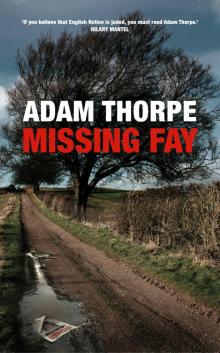 Missing Fay
Missing Fay Hodd
Hodd Pieces of Light
Pieces of Light The Standing Pool
The Standing Pool Ulverton
Ulverton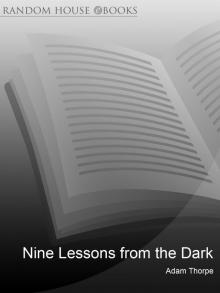 Nine Lessons From the Dark
Nine Lessons From the Dark Flight
Flight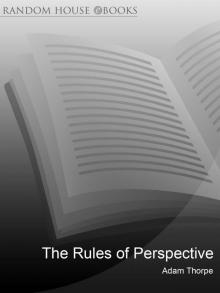 The Rules of Perspective
The Rules of Perspective From the Neanderthal
From the Neanderthal Is This the Way You Said?
Is This the Way You Said? Still
Still No Telling
No Telling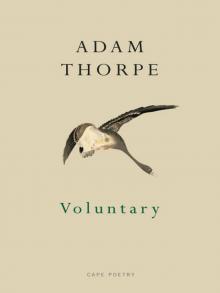 Voluntary
Voluntary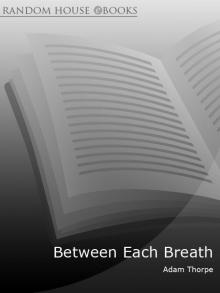 Between Each Breath
Between Each Breath